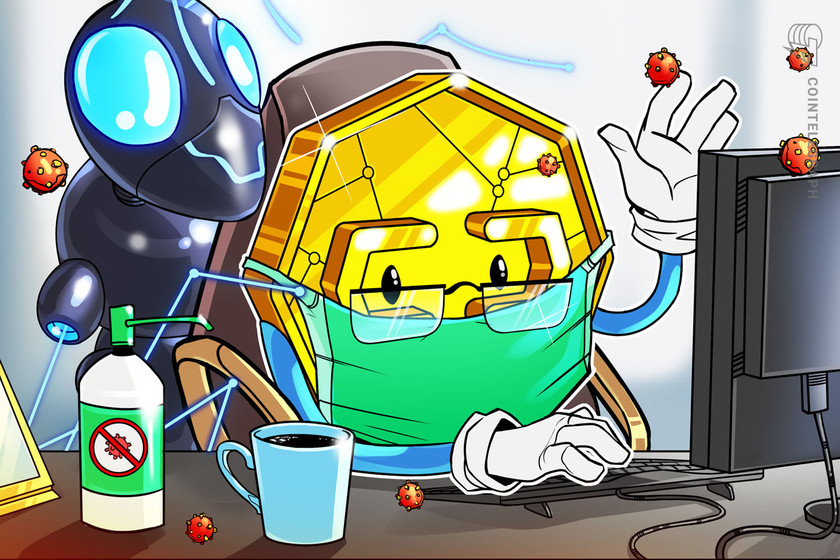Finance Redefined: Parachute journalism on the frontlines of DeFi! May 19-26
As a kid who grew up in a podunk-nothing, mid-sized American city, I know what it’s like to read parachute journalism covering topics and stories close to my heart. Some bad news for my fellow DeFi brethren: you’re all about to get a taste of that feeling, too.
A colloquialism for when reporters tackle material outside their normal scope (picture a correspondent ‘parachuting’ into a war zone, clipping up a short segment, and beaming back to more hospitable climes), parachute journalism often leads to uninformed, sensationalist, and/or propagandistic coverage lacking key nuance — work that consciously or unconsciously confirms the biases of the audience or the reporter themselves. Growing up, I read it over and over again when some new intelligencer blew through town — an ascot-wearing so-and-so covering the G20, the Stanley Cup finals, a campaign stump. They often worked for a publication with “New York” in the title, and were always so pleasantly taken by how a smoggy former steel town could have restaurants that served edible food — somehow our “culinary scene” has been “up-and-coming” for the better part of thirty years.
I could go on, but I’ll save yinz. Point is, if the last week is any indication it’s best to get ready for a whole lot of gasbags phoning in boilerplate takes from the frontlines of DeFi.
Amid predictable memecoin, “look at these kids speculating” narrative fare, in the past week CNBC, Bloomberg, Fortune, and the Wall Street Journal have all featured pieces on decentralized finance intros, profiles, and overviews. Some have been readable, including a “Made It” CNBC profile on DeFi angel investor Cooper Turley — a well-respected advocate whose only blemish is that he stubbornly continues to support ‘social tokens’ as a use case. Others have been puzzling.
— Andrew T (@Blockanalia) May 20, 2021
It’s odd to hear strangers gossiping about your house. To this end, it was a balm to see Blockchain Capital’s Spencer Bogart handle an interview with CNBC with grace, charm, and enough wit to dance on heads:
Defi will massively transform the crypto industry, or will it? @emilychangtv and @thestalwart ask Blockchain Capital’s Spencer Bogart https://t.co/GYN6SHomsh pic.twitter.com/X1utENtqAr
— Bloomberg TV (@BloombergTV) May 25, 2021
The bar has been set — any DeFi aficionado interviewed on live TV owes it to the culture to wink at the home crowd. “Future of France” indeed.
Separating signal from noise in crypto can be notoriously difficult. I’d argue that the sudden influx of mainstream airborne regiments are all noise — look past them, and see what’s brewing in the background.
This week, the University of Pennsylvania’s Wharton school of business published a research report titled “DeFi Beyond the Hype.” Likewise, Goldman Sachs published a piece earlier this month arguing that Ethereum beats Bitcoin as a store-of-value in part because an overwhelming portion of DeFi is built using the Ethereum chain.
“Ether beats bitcoin as a store of value. The Ethereum ecosystem…provides developers a way to create new apps. Most of DeFi apps are being built on Ethereum. The greater number of transactions in ether vs bitcoin reflects this dominance” – Goldman Sachs Global Macro Research pic.twitter.com/vNkQ1HlDYM
— SantΞago R Santos (@santiagoroel) May 22, 2021
Much like how the value propositions Bitcoin proponents parroted over the course of a decade finally worked their way into soundbites and research notes last year, DeFi’s narrative rise now seems inevitable.
Even when it’s well-intentioned, parachute journalism can feel glib and condescending to those truly versed in the topic at hand — but it’s easier to swallow when better and broader awareness is on the horizon.
A condensed history of DeFi on Bitcoin
The Tweet of the week comes from DeFi Pulse’s Scott Lewis, who gave us a condensed history of how Bitcoin maximalists attempt to warp narrative reality about the growing might of DeFi:
history of bitcoin on defi:
Dec 2018: DeFi is a scam
Mar 2019: it is offensive to say Lightning Network is DeFi .
July 2020: well actually bitcoin is the only DeFi project that matters. yields are a scam.
May 2021: we are love defi. we are building defi. yields coming soonTM.— Ξ (@scott_lew_is) May 26, 2021
This is an abrupt about-face from the past year or two, a period where Bitcoin-or-nothing types ignored DeFi, passed it off a curiosity, or attempted in some cases to talk it out of existence. As Michael Saylor recently and bizarrely tried to argue in a poignant fit of denialism, if you simply ignore all other chains and assets (and the significant sums of value that they’re driving) with some arbitrary definitions, Bitcoin’s dominance actually stands at 93%!
When considering network dominance in the crypto industry, I find it clarifying to separate crypto-asset networks like #Bitcoin from crypto-application networks like Ethereum & stablecoins. Bitcoin dominance has advanced from a low of 71.05% on December 20, 2017 to 93.57% today. pic.twitter.com/03cbWVyoLY
— Michael Saylor (@michael_saylor) September 20, 2020
In reality there have long been good teams working towards Bitcoin-based smart contracts and DeFi products. Perhaps the best known is RSK Labs, though much like Ethereum’s very own Optimism they always seem a few months away from being a few months away (shouts, Bruno Caboclo). Early Bitcoin experiments should be credited for paving the way for blockchain-based smart contracts as well: Vitalik cites the Colored Coins project as one of his inspirations for ETH.
Moving forward, Bitcoiners will be cheering for and closely watching RSK and others as they inch towards production — the kind of obsessive monitoring and “breadcrumb-hunting” usually seen among shitcoin communities. Lord, how delicious.
But no matter how many BTC-based projects reach mainnet, the race has already been run. There are both trusted and trustless BTC yield-bearing products in production as of today. Badger and Ren’s collaboration is proof of how far non-native ecosystems are ahead: two projects could collaborate on a deep integration bridging multiple contracts and products to create a one-click, cross-chain yield-bearing account. Each component step of that is a small feat requiring an organic developer community — the type that takes years to build.
Hodlers, of course, will argue that Bitcoin is the most trusted — the only one institutions will opt for, something something “second move advantage.” Problem is, institutions don’t trust any coins at all, hardcore hodlers don’t trust RSK, and while Ethereum-based DeFi users are increasingly branching out to alternatives like Solana and Polygon, what unique qualities can Bitcoin-based DeFi offer? Realistically, where do the TVL and the developers come from?
I own Bitcoin and I plan to buy more in the future, so I’m not bashing. But for the present and the foreseeable future, the DeFi narrative is out of their control.
Other major stories this week:
CT Consulting: Polygon on the rise
DeFi leads rebound, total crypto mcap gains $400 billion
Uniswap v3 eclipses v2 in volume
BSC project gets exploited for $3 million
Stablecoin market raises $3.5 seed round









